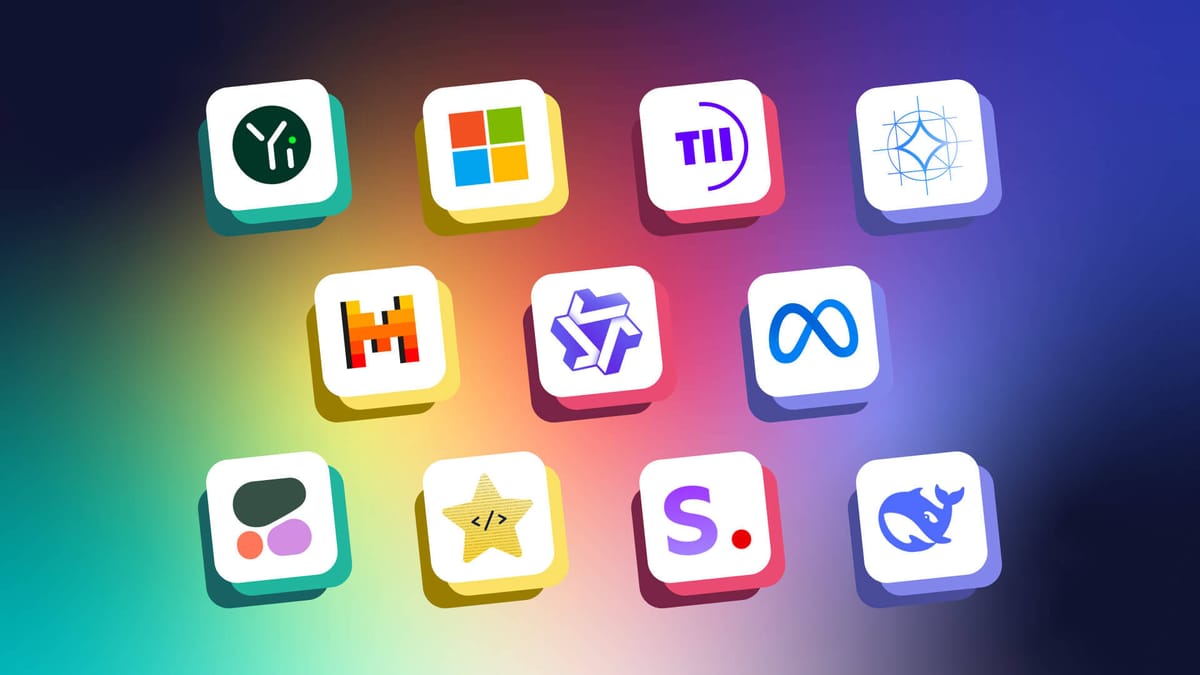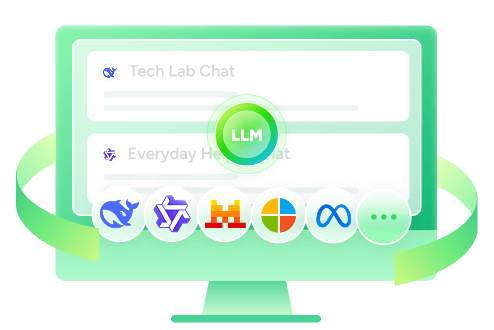Why switch tabs? Nut Studio integrates top online LLMs and local models like DeepSeek & GPT-OSS into a single interface. Chat online or run locally for free with zero complex deployment.
If you're trying to pick the best LLM for coding in 2026, we got you covered. The Nut Studio Team spent weeks testing 20+ top models across every use case: closed-source powerhouses like GPT-5.2-Codex and Claude Opus 4.5, Google's Gemini 3 Pro, and open-source game-changers like GPT-OSS-120B, Qwen3-235B, and DeepSeek-R1.
Whether you care about raw speed, full-project context, or models that run on a budget GPU, this ranked guide has you covered. We're breaking down speed, accuracy, cost, and compatibility to match your workflow. Let's start—stop testing and start coding with the best model.

CONTENT:
What Makes an LLM the Best Choice for Coding?
If you're asking "which coding LLM is best", the answer depends on your workflow—but the way to evaluate them? Here's the modern framework to separate hype from real value.
Not all coding LLMs are built equal: some nail quick scripts, others handle full-stack projects, debug production bugs, or run on a budget GPU. To cut through the noise, we combine next-gen benchmarks (the ones that actually mirror real work) and practical metrics (the features that make or break your daily coding).
Key Coding Benchmarks
- SWE-Bench Verified: The gold standard for real-world coding. Tests a model's ability to fix actual GitHub issues (end-to-end, with execution validation). SOTA models like GPT-5.2-Codex and Claude Opus 4.5 now score 80%+, while top open-source models (e.g., GPT-OSS-120B) hit 65%—a critical gap for enterprise use.
- LiveCodeBench-Hard: Focuses on complex, multi-step tasks (e.g., refactoring codebases, integrating APIs) that mimic professional workflows. Essential for developers working on large projects, not just snippets.
- CodeLlama-Bench-v2: The go-to for open-source models. Measures performance across 8+ languages (Python, Java, Rust, Go) and edge cases (memory management, concurrency)—perfect if you're choosing a local/OSS model.
- SecurityBench: New but non-negotiable. Tests if the model generates vulnerable code (e.g., SQL injections, buffer overflows). Enterprise teams and security-focused devs prioritize this over raw speed.
- SQLGlot-Bench: Replaces Spider 2.0 for industrial SQL. Evaluates complex queries (joins, window functions) across real-world schemas (e.g., PostgreSQL, BigQuery)—key for data engineers.

Metrics That Matter
Benchmarks tell you "can it perform" but these metrics tell you "will it work for you"—especially if you're after free, local, or open-source options:
| Metric | Why It Matters |
|---|---|
| Task Fit | "Good at code isnt enough—measure performance on your real mix (frontend, backend, SQL, DevOps, tests, refactors). |
| Context Handling | Big windows are common; what matters is whether it can reliably use large repo context (search, files) without missing key details. |
| Latency & Throughput | Fast responses keep you in flow: interactive edits vs. long generations, plus how well it handles parallel requests (team/CI). |
| Deployment & Use | How hard is it to run where you need it (laptop, workstation, on-prem): packaging, updates, GPU/RAM needs, and stability. |
| Security & Privacy | Can it run offline/on-prem? Does it reduce risky code patterns and protect sensitive IP? |
A model that crushes SWE-Bench might be too expensive for a hobbyist. An open-source model that runs on your laptop might struggle with enterprise-scale projects. The goal isn't to find the "absolute top" model—it's to find the one that aligns with:
- Your use case: Quick scripts vs. full projects vs. SQL
- Your setup: Cloud vs. local, GPU specs
- Your constraints: Free vs. paid, privacy requirements
Benchmarks and metrics are your compass—but in the next section, we'll rank the top models from online to local, so you can skip the guesswork. Whether you're a solo dev on a budget or a team building production software, we've got the perfect match for your workflow.
For users who want both coding and creative writing power, some of the best LLMs for writing also support code generation, giving you a dual-purpose AI tool.
Download Nut Studio for free now—get top-tier LLM coding tools running locally in under 30 seconds!

[Online Models] Top Coding LLMs in 2025 — Ranked and Compared
Among the latest cloud-based, closed-source LLMs, three leaders stand head and shoulders above the rest—optimized for real-world engineering rather than just passing benchmarks. Based on weeks of hands-on testing and developer feedback from Reddit and GitHub, GPT-5.2-Codex, Claude Opus 4.5, and Gemini 3 Pro currently dominate the field. Each excels in distinct workflows, ranging from large-scale enterprise refactoring to rapid frontend prototyping.
GPT-5.2-Codex is the "reliable senior engineer" for long-haul projects, while Claude Opus 4.5 crushes large codebases and security-focused tasks. Gemini 3 Pro? It's the unbeatable choice for frontend and multi-modal coding. These models each own a niche, and we're breaking down exactly which fits your work.
Side-by-side comparison of 2025's top closed-source coding LLMs:
| Model | SWE-Bench Verified | LiveCodeBench-Hard | SecurityBench Score | Strengths | Weaknesses | Best For |
|---|---|---|---|---|---|---|
| GPT-5.2-Codex | 80.0% | 75.3% | 92/100 | Long tasks, reasoning, design-to-code | Limited API, slower reasoning | Enterprise, Windows, reasoning |
| Claude Opus 4.5 | 80.9% | 78.1% | 88/100 | 1M context, 67% cheaper, agentic | 45min limit, weaker math/ARC | Codebases, security, agents |
| Gemini 3 Pro | 76.2% | 72.7% | 83/100 | Deep Think, 100M context, multimodal | Flash variant outperforms (78%) | Web dev, research, multimodal |
Tiered Pricing: GPT-5.2 vs. Claude 4.5 vs. Gemini 3
| Model | Free Quota (Monthly) | Paid Pricing (Per 1M Tokens) |
|---|---|---|
| GPT-5.2-Codex | Varies by tier; typically limited by request count | $1.75 (input) / $14.00 (output) |
| Claude Opus 4.5 | Free Haiku/Sonnet access only; Opus requires Pro ($20/mo) | $5.00 (input) / $25.00 (output) |
| Gemini 3 Pro | Free tier often has rate limits per minute | $2.00 (input) / $12.00 (output) |
Nut Studio gives you free chance to premium online models, plus one-click local models with zero deployment hassle. The platform auto-detects your hardware and recommends models you can actually run.
SWE-Bench Verified tests real GitHub issue fixes (the gold standard for practical coding), LiveCodeBench-Hard measures multi-step complex tasks (like refactoring or API integration), and SecurityBench flags vulnerable code (non-negotiable for production). Unlike outdated metrics like HumanEval (now 95%+ for top models), these separate "can write code" from "can ship reliable code."
In practice, GPT-5.2-Codex's Windows compatibility and 24-hour task stability make it a hit with enterprise teams, while Claude Opus 4.5's 1M+ token context lets solo devs upload entire codebases for debugging. Gemini 3 Pro is the go-to for frontend devs—turning a UI sketch into a working React app in seconds, thanks to its unbeatable WebDev Arena score.
But what if you want privacy, no subscription fees, or models that run on your budget GPU? Next up, we're ranking the best free, open-source, and local coding LLMs—so you can get the power you need without being tied to the cloud. Whether you're a hobbyist, a privacy-focused dev, or a team looking to cut costs, we've got your perfect match.
[Local Models] What Is the Best Local LLM for Coding?
More developers now prefer local LLMs for coding because of privacy, cost savings, and offline use. Running AI on your own PC keeps your code private and avoids cloud fees. Here are the best open source LLM for coding in 2025:
| Model | SWE-Bench Verified | Supported Languages | VRAM Requirement (4-bit/GPTQ) | Strengths | Deployment Tools | Nut Studio |
|---|---|---|---|---|---|---|
| GPT-OSS-120B | 65.0% | 600+ (full-stack focus) | 24 GB (4-bit); 32 GB (FP8) | MoE architecture, near-closed-source reasoning, enterprise-grade stability | Ollama, Docker, vLLM | ✓ One-click |
| Kimi-Dev-72B | 60.4% | 500+ (bug-fix specialty) | 16 GB (4-bit); 20 GB (FP8) | Open-source bug-fix champion, dual-role (BugFixer+TestWriter) collaboration, 150B GitHub tokens trained | Ollama, Hugging Face TGI | Manual setup |
| Qwen3-235B | 62.3% | 100+ (multi-task) | 24 GB (4-bit); 28 GB (FP8) | Extreme VRAM optimization, 12x context extension, excels in coding/math | Ollama, FlashAI one-click | ✓ One-click |
| DeepSeek-R1 | 57.6% | 80+ | 16 GB (14B 4-bit); 32 GB (72B 4-bit) | Open-source benchmark, chain-of-thought output, MIT license (no commercial restrictions) | Ollama, Open WebUI | ✓ One-click |
| Qwen3-30B | 52.1% | 100+ | 8 GB (4-bit); 10 GB (FP8) | Only 3B active parameters, outperforms Qwen3-32B, best for budget GPUs | Ollama, Docker, CPU fallback | ✓ One-click |
| StarCoder2-7B | 48.3% | 600+ (multilingual completion) | 4-5 GB (4-bit) | High-concurrency optimized, GQA architecture, team-friendly on 32GB GPU | Ollama, vLLM (best for concurrency) | Manual setup |
DeepSeek R1 is a specialized reasoning model that uses reinforcement learning to "think" through problems, making it significantly better for advanced math, deep logical analysis, and complex coding tasks where accuracy is more critical than speed. Conversely, DeepSeek V3 (and its upgraded V3.2 version) is a faster, more cost-efficient general-purpose assistant optimized for creative writing, everyday conversational tasks, and standard programming.
If setting up local LLMs sounds complicated, Nut Studio makes it simple. It's a free desktop app that lets you download and run local coding models with just one click—no terminal or coding skills needed.
Nut Studio automatically detects your hardware and picks the best compatible model, so you get the fastest, smoothest experience without any setup stress. Whether you want to try Qwen3, DeepSeek, or Mistral, this is the easiest way to start coding offline and keep your data private.

Key Features:
- Download and launch 50+ top LLMs like Llama, Mistral, Gemma.
- Easy setup with no coding, perfect for beginners and pros.
- No internet required. Use local LLMs for coding anytime, anywhere, completely offline.
- Your data stays on your device. Nothing is uploaded or tracked.
- With 100+ agents, Nut Studio helps with writing, planning, blogging — and offers some of the best AI RP out there.
How Do Open-Source Coding LLMs Compare to Closed-Source Ones?
When picking the best LLM model for coding, one big choice is whether to use an open-source model or a closed-source one. Both have pros and cons—and the right choice depends on what matters most to you.
Closed-source models like GPT-5.2-Codex, Claude Opus 4.5, or Gemini 3 Pro are powerful. They're great at code generation, often lead benchmark scores, and are easy to use with tools like GitHub Copilot. But they run in the cloud. That means you need internet access, and your code is shared with external servers. This may raise privacy or cost concerns.
For a detailed side-by-side look at how these models compare, check out our in-depth chatgpt vs gemini vs claude comparison guide.
Open-source models, like OpenAI's new GPT-OSS (open-weight), Qwen3 or DeepSeek and Llama are free to use and can run entirely on your device. They give you full control. You can tweak them, run them offline, and avoid sending code to the cloud. That’s a big plus if you care about data privacy, offline coding, or building your own AI tools.
Here's a quick comparison:
| Feature | Closed-Source LLMs | Open-Source LLMs |
|---|---|---|
| Access | Cloud only | Can run locally |
| Cost | Often subscription-based | Usually free and self-hosted |
| Performance | Top-tier (GPT-5.2-Codex, Claude Opus 4.5) | Catching up fast (GPT-OSS, Qwen3) |
| Customization | Limited | Full control |
| Privacy | Code sent to servers | Stays on your device |
| Ease of Use | Plug-and-play in IDEs | Needs a setup (but tools like Nut Studio make it easy) |
Download Nut Studio for free — Run top LLMs locally with one click!
FAQs About the Best LLMs for Coding
1 What is the best LLM for coding right now?
The best LLM for coding right now depends on your needs. For cloud use, GPT-5.2-Codex and Claude Opus 4.5 lead the pack. For local setups, the best models are GPT-OSS and Qwen3 for their powerful reasoning.
2 Which AI model performs best for real-world coding tasks?
Models like GPT-5.2-Codex excel at handling complex projects, debugging, and multi-language support. Locally, DeepSeek, Qwen 3 and Llama 3 are strong performers that you can run without internet.
3 Can I run a coding LLM locally for free?
Yes. Many open-source coding LLMs like Qwen 3 and DeepSeek are free to download and run on your own PC. You just need compatible hardware and the right tools. With Nut Studio, you don't need to write any terminal commands — just download, click, and run.
4 Do I need a GPU to use a local coding LLM?
You usually need a decent GPU with enough VRAM (8GB or more) for smooth local coding LLM performance. Some smaller models run on CPU but will be slower. Nut Studio checks your system and recommends the best local model for code — no hardware guesswork.
5 Is it safe to run these models offline?
Absolutely. Running LLMs locally means your code stays on your device. No data is sent to external servers, which keeps your projects private and secure.
Nut Studio checks your system and recommends the best local model for code — no hardware guesswork.
Conclusion
If you're looking for the best AI models for coding, your choice depends on whether you prefer speed and convenience from cloud tools or full privacy and control with local setups. For developers who want to work offline, avoid cloud costs, and keep their code private, the new generation of local models like GPT-OSS and Qwen3 are top picks. They offer performance that was exclusive to cloud models just months ago.
 Nut Studio
Nut Studio













Was this page helpful?
Thanks for your rating
Rated successfully!
You have already rated this article, please do not repeat scoring!